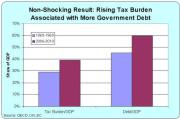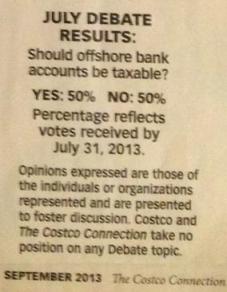I’m very worried about America’s fiscal future. Simply stated, data from several sources (BIS, OECD, and IMF) indicates that we face a future Greek-style fiscal crisis unless policy makers implement genuine entitlement reform.
Unfortunately, politicians have little incentive to control spending and reform programs if they think that higher taxes are an option.
So how do we control their appetite for more revenue? There’s no silver bullet solution, but part of the answer is that we need tax competition and tax havens. Politicians are less likely to over-tax and over-spend if they’re afraid that the geese that lay the golden eggs can fly across the border.
In other words, tax competition is a necessary but not sufficient condition to promote good policy. And that’s why I’m willing to defend tax havens, even if it requires bringing a message of liberty to traditionally hostile audiences such asreaders of the New York Times and viewers of CNN.
That’s also why I share well-written and compelling articles on the topic, such as this editorial by Pierre Bessard from Switzerland’s Liberales Institut and this column by Allister Heath of England’s City AM business newspaper.
Recommended
I have a new piece to add to this collection. Professor Philip Booth and Dr Richard Wellings of the London-based Institute of Economic Affairs have produced a succinct and powerful case for tax competition and tax havens.
Here are some excerpts from the article they wrote for IFC Review. They start by warning that politicians have done a crummy job in most developed nations.
If we consider the performance of high-tax Western countries in recent years – which includes, amongst others, every EU country, plus the US – it has been pretty grim. These are countries which, despite their high levels of taxation, are building up huge debts. These countries also regulate their financial systems heavily, often through bodies which have huge discretion, and yet they have recently suffered the worst financial crisis since the Second World War. You would think that it would be this model – the corporatist model of high taxes and extensive regulation – that would be coming under scrutiny. However, like small children who wish to shift the blame, the EU is focusing its attention on International Financial Centres (IFCs).
Well said, though I would make one small correction. These nations have “huge debts” in part because of – not “despite” – “high levels of taxation.”  That’s because of the Laffer Curve causing revenues to be lower than expected when taxes are raised and also because politicians can’t resist spending any revenue that is generated.
That’s because of the Laffer Curve causing revenues to be lower than expected when taxes are raised and also because politicians can’t resist spending any revenue that is generated.
Returning to the article, Booth and Wellings make the important observation that these so-called tax havens largely exist because of bad policy in other nations.
Just as offshore centres came into being as a result of incompetent regulatory and tax policy from the US government in the 1960s and 1970s, these centres are just as important today in ensuring the free flow of international capital. The nature of our corporation tax systems is such that investors can be taxed several times over on the same profits. Companies can be taxed when they make profits; investment funds can be taxed on their returns; and investors in funds can be taxed by their home tax authorities. In addition, capital gains tax systems often end up taxing companies when their share price rises as a result of the retention of profits or the anticipation of future profits even though extra tax is levied on those profits when they accrue. If governments reformed their corporation tax systems so that they were coherent and focused on the shareholder rather than on the activities of companies themselves, there would be much less need for IFCs.
Amen. If politicians in high-tax nations really want to hurt tax havens, they should lower tax rates and reform their tax systems.
But I’m not holding my breath waiting for that to happen, so we need some external pressure to encourage good policy.
Booth and Wellings explain how tax competition leads to better policy, which leads to better economic performance.
…competition brings major economic benefits. There are very strong incentives for politicians to increase public spending (and hence taxes) in order to gain the support of powerful special interest groups and raise their chances of re-election. Partly as a result, most Western governments now confiscate around two-fifths of people’s earnings. Such high tax rates mean many wealth-creating economic activities are no longer viable. Indeed, long-term studies suggest that every one per cent added to the level of taxation (as a share of GDP) tends to reduce economic growth by about 0.15 per cent a year. Accordingly, a 10 percentage point increase would decrease average growth rates by around 1.5 per cent a year. High rates of taxation therefore have a very significant and negative long-term impact on living standards.
But I think this passage is the most important part of the article. Tax competition is necessary to protect people from greedy and short-sighted politicians.
This is one reason why IFCs are so important. They act as a deterrent to predatory politicians who wish to raise tax rates to highly damaging levels. Policymakers know that, if they set tax rates too high, business activity will shift to lower tax jurisdictions. The point at which tax increases no longer result in additional revenue to governments is therefore shifted downwards by competition from IFCs. This means tax rates will tend to be closer to the optimal rate for economic growth.
The authors also explain that slower growth has a big impact on government finances.
Lower levels of overall economic output mean fewer resources are available to spend on areas such as health and education. Arguments that high tax rates are necessary to fund essential public services are therefore deeply flawed. High-tax, high-spend policies are entirely counter-productive since their negative effect on economic output inevitably results in lower public spending in the long term. While state spending may absorb a larger share of the economy under the high-tax approach, the overall size of the economy will be very much smaller, limiting the resources available to government.
In other words, if the statists want both prosperity and ample tax revenue, they’re better off supporting modest-sized government and reasonable tax rates.
But this may be the fundamental divide between proponents of economic liberty and supporters of statism. Advocates of big government act as if they are more interested in punishing success than they are in enabling upward mobility for the less fortunate.
That seems perverse, but it’s the explanation that matches their behavior.
But it’s not my job to psychoanalyze statists. Let’s close by sharing my video primer on tax competition.
By the way, Professor Greg Mankiw at Harvard has made very similar points.
P.S. Leftists love to criticize “tax havens,” perhaps because they feel guilty about using them.
P.P.S. While the U.K. government is very misguided on fiscal policy issues (with the exception of Mark Field), there are a couple of Brits in the European Parliament. You’ll enjoy these short speeches by Dan Hannan and Godfrey Bloom.
 P.P.P.S. I’m happy to share the news that late-reporting precincts have pushed me into a tie in the Costco poll on whether governments should try to tax outside their borders and persecute low-tax jurisdictions. As I noted last month, I was trailing by a 51-49 margin (though even that was somewhat surprising since I thought the poll used misleading language). Anyhow, here’s the debate and you can still cast a vote by clicking here.
P.P.P.S. I’m happy to share the news that late-reporting precincts have pushed me into a tie in the Costco poll on whether governments should try to tax outside their borders and persecute low-tax jurisdictions. As I noted last month, I was trailing by a 51-49 margin (though even that was somewhat surprising since I thought the poll used misleading language). Anyhow, here’s the debate and you can still cast a vote by clicking here.
P.P.P.P.S. Perhaps the most persuasive evidence is that the New York Timesinadvertently admitted that tax competition is one of the few effective ways of fighting excessive government.


